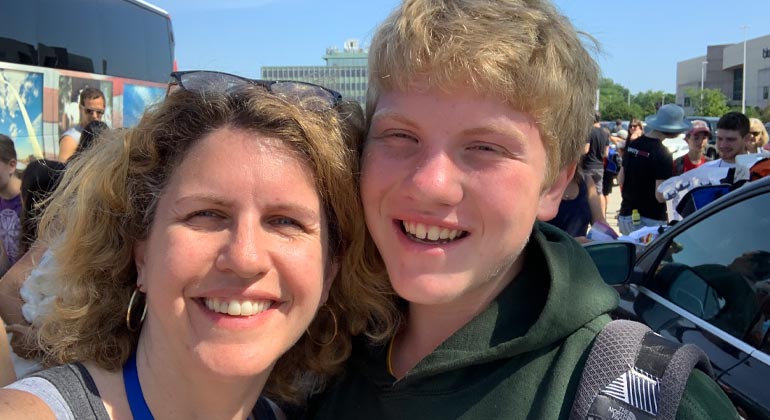The Stickiness of Jewish Camp

I’ve written about my family before—how I met my husband at the Bernard Horwich JCC at the age of 20, converted to Orthodox Judaism, and embrace the joys and challenges of raising four kids. I find that sharing my own story makes it easier to both connect with others and for others to find connection with me. Truth is, we all have something—actually, many things—in common.
In my work with the J, I spend a great deal of time thinking about those connections and, more specifically, Jewish connection. Given that our work is focused on what feels like a somewhat ethereal, meta goal of Jewish continuity and the strengthening of our tribe, does what we do stick?
Among my four kids, three attended Jewish preschool, two were students of Jewish day school, all four attended Hebrew school and one has spent every summer at Jewish camp. In many ways, my family is a microcosm of experimentation of my professional focus… what Jewish experiences lead to future Jewish choices?
As the child of a teacher who spent her summers at home, I didn’t go to overnight camp. Instead, my summer days were comprised of bike rides to the beach, extended time on the tennis court and quality time with my mom. As a parent with a demanding job and lots of kids, I welcomed the opportunity to put them on a bus and send them off for weeks at a time. For the older ones, the kids who started at Jewish preschool and day school, we chose our local YMCA camp as I felt a need to mix it up a bit. For the youngest, who missed those experiences due to the twists and turns of my Jewish journey, I found my way to Apachi and then Camp Chi.
I honestly didn’t think much of it. I mean, camp is camp, right? Nope. Jewish camp is different. I had a glimpse of Camp Chi magic from my staff seat, but it didn’t come close to the reality. This place—this Jewish place—has come to practically define my kid. I saw him belt out Ha’motzei at the flagpole before breakfast alongside his cabinmates when I visited camp during his first summer. He knows the bracha? He knows a bracha?! I was astounded. Despite early years of preschool and day school I couldn’t say the same for his older siblings.
Having become a full summer camper three years ago, he’s chosen to have his bar mitzvah at camp, he signed up for Ta’am Israel with a camp friend, he’s curious about BBYO. He is wholly and beautifully self-identifiably Jewish. What’s more, his sister, the oldest of the bunch, found her way to Jewish camp as a counselor at the age of 17. Like her youngest brother, first at Apachi and then Chi—initially, the first four weeks and then the full summer. She’s re-learned the brachot, she’s excited about Birthright, she signs up for services at Chabad on campus. She is wholly and beautifully self-identifiably Jewish.
There are countless studies and articles that document the impact of Jewish camp. While my own experience is far from scientific, it is real. And as an agency that focuses on how to engage our community in Jewish choice and Jewish life, one of the most powerful vehicles we have is camp. Summer camp, family camp, winter camp, PJ Library Goes to Camp, Keshet Special Needs Family Camp, Grandparents Weekend. Every moment at camp is a powerful experience in Jewish life.
Maybe it’s because our people are together. Maybe it’s because our kids are mentored by leaders who dedicate themselves to the values we hold dear as a community. Maybe it’s because the screens are off and true friendships are turned on. Maybe because, whether you’re looking for it or not, being part of our people fills our cup to the fullest. Regardless of the reason, I am grateful that it exists and that my family is fortunate enough to benefit from its impact.
A few years ago, my daughter asked me, “If you could go back, would you have raised us differently?” My answer then was that I did the best I knew at that time. If she asked me again, I would edit my response. “Yes, I would have sent you all to Jewish camp from day one because it is the most beautiful and stickiest of Jewish experiences I could hope for you.”






